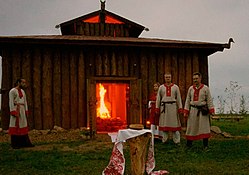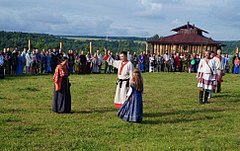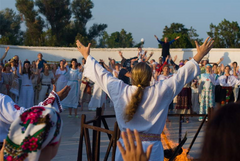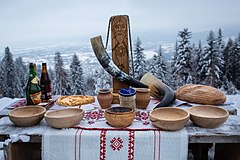
Back Роднавер’е Byelorussian Родноверие Bulgarian Rodisme Catalan Rodnověří Czech Rodismus German Neopaganismo eslavo Spanish Slaavi uuspaganlus Estonian Rodismi Finnish Rodnovérie French Rodismo Galician
This article may be too long to read and navigate comfortably. (June 2023) |
 A ceremony in the temple of the Fire of Svarozhich of the Union of Slavic Communities, Kaluga Oblast | |
| Founder | |
|---|---|
| Zorian Dołęga-Chodakowski Volodymyr Shaian others | |
| Regions with significant populations | |
| Russia | 10,000[1] — 757,000 (2012)[2][3] |
| Ukraine | 5,000 — 10,000[4] |
| Poland | 7,000 — 10,000[5] |
| Religions | |
| Ethnic neopaganism | |
| Languages | |
| Slavic | |
| Part of a series on |
| Slavic Native Faith |
|---|
 |



The Slavic Native Faith, commonly known as Rodnovery[α] and sometimes as Slavic Neopaganism,[β] is a modern Pagan religion. Classified as a new religious movement, its practitioners hearken back to the historical belief systems of the Slavic peoples of Central and Eastern Europe, though the movement is inclusive of external influences and hosts a variety of currents. "Rodnovery" is a widely accepted self-descriptor within the community, although there are Rodnover organisations which further characterise the religion as Vedism, Orthodoxy, and Old Belief.
Many Rodnovers regard their religion as a faithful continuation of the ancient beliefs that survived as a folk religion or a conscious "double belief" following the Christianisation of the Slavs in the Middle Ages. Rodnovery draws upon surviving historical and archaeological sources and folk religion, often integrating them with non-Slavic sources such as Hinduism (because they are believed to come from the same Proto-Indo-European source). Rodnover theology and cosmology may be described as henotheism and polytheism—worship of the supreme God of the universe and worship of the multiple gods, the ancestors and the spirits of nature who are identified in Slavic culture. Adherents of Rodnovery usually meet in groups in order to perform religious ceremonies. These ceremonies typically entail the invocation of gods, the offering of sacrifices and the pouring of libations, dances and communal meals.
Rodnover ethical thinking emphasises the good of the collective over the rights of the individual. The religion is patriarchal, and attitudes towards sex and gender are generally conservative. Rodnovery has developed distinctive strains of political and identitary philosophy. Rodnover organisations often characterise themselves as ethnic religions, emphasising their belief that the religion is bound to Slavic ethnicity. This belief often manifests itself in forms of nationalism and racism. Rodnovers often glorify Slavic history, criticising the impact of Christianity on Slavic countries and arguing that these nations will play a central role in the world's future. Rodnovers share the strong feeling that their religion represents a paradigmatic shift which will overcome the mental constraints which were imposed by feudalism and by what they call "mono-ideologies".
The contemporary organised Rodnovery movement arose from a multiplicity of sources and charismatic leaders just on the brink of the collapse of the Soviet Union and it spread rapidly during the mid-1990s and 2000s. Antecedents of Rodnovery existed in late 18th- and 19th-century Slavic Romanticism, which glorified the pre-Christian beliefs of Slavic societies. Active religious practitioners who were devoted to establishing the Slavic Native Faith appeared in Poland and Ukraine during the 1930s and 1940s, while the Soviet Union under the leadership of Joseph Stalin promoted research into the ancient Slavic religion. Following the Second World War and the establishment of communist states throughout the Eastern Bloc, new variants of Rodnovery were established by Slavic emigrants who lived in Western countries, later, especially after the collapse of the Soviet Union, they were introduced into Central and Eastern European countries. In recent times, the movement has been increasingly studied by academic scholars.
- ^ Aitamurto 2007.
- ^ Beskov 2015, p. 17.
- ^ Beskov 2020, p. 313.
- ^ Evaluation of the Secretary of the Department of Religious Studies of the Institute of Philosophy of the National Academy of Sciences of Ukraine Dmytro Bazik // Segodnya. July 7, 2013.
- ^ Kośnik & Hornowska 2020, p. 74.
- ^ Simpson & Filip 2013, p. 36.
- ^ Petrović 2013, passim; Rountree 2015, p. 217; Saunders 2019.
- ^ Laruelle 2012, pp. 293–294.
Cite error: There are <ref group=lower-greek> tags on this page, but the references will not show without a {{reflist|group=lower-greek}} template (see the help page).
© MMXXIII Rich X Search. We shall prevail. All rights reserved. Rich X Search